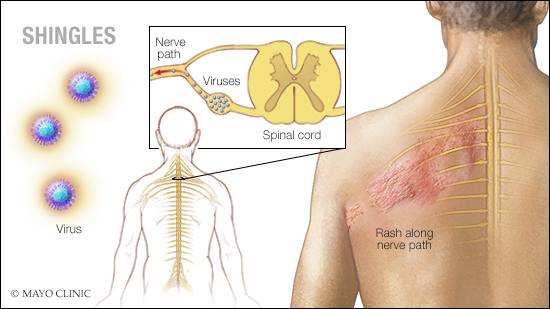-
Health & Wellness
Shingles vaccine: Should I get it?

Question: What are my options for the shingles vaccine? If I've already had shingles, should I get the vaccine so that I don't get shingles again?
Answer: People looking to receive the shingles vaccine now have two options. The Food and Drug Administration in 2017 approved Shingrix. It's the preferred alternative to Zostavax, which was approved in 2006.
Both vaccines are approved for adults age 50 and older for the prevention of shingles and related complications, whether they've already had shingles or not. You may get the Shingrix vaccine even if you've already had shingles. Also, consider getting the Shingrix vaccine if you've had the Zostavax vaccine or if you don't know whether you've had chickenpox.
Zostavax is a live vaccine given as a single injection, usually in the upper arm. Shingrix is a nonliving vaccine made of a virus component. It's given in two doses, with two to six months between doses. The most common side effects of either shingles vaccine are redness, pain, tenderness, swelling and itching at the injection site, and headaches.
Some people report a chickenpox-like rash after getting the shingles vaccine.
Although some people will develop shingles despite vaccination, the vaccine may reduce the severity and duration of it.
Talk to your health care provider about your vaccination options if you:
- Have ever had an allergic reaction to gelatin, the antibiotic neomycin or any other component of the shingles vaccine
- Have a weakened immune system due to HIV/AIDS or another disease that affects the immune system
- Are receiving immune system-suppressing drugs or treatments, such as steroids, adalimumab (Humira), infliximab (Remicade), etanercept (Enbrel), radiation or chemotherapy
- Have cancer that affects the bone marrow or lymphatic system, such as leukemia or lymphoma
- Are pregnant or trying to become pregnant
Zostavax has been shown to offer protection against shingles for about five years. Although Zostavax is approved for people age 50 and older, the Centers for Disease Control and Prevention recommends that Zostavax be given at age 60, when the risk of shingles and its complications is highest. While Zostavax is no longer being sold in the U.S. as of July 2020, other countries may still use it.
Studies suggest protection against shingles with Shingrix may extend beyond five years. Shingrix is approved and recommended by the Centers for Disease Control and Prevention for people age 50 and older, including those who've previously received Zostavax.
The cost of the shingles vaccine may not be covered by Medicare, Medicaid or insurance. Check your plan.
Related information:
- Mayo Clinic Minute: What are eye shingles?
- Infectious Diseases A-Z: Over age 50? Get your shingles vaccine
____________________________________
This article is written by Mayo Clinic staff. Find more health and medical information on mayoclinic.org.
Related Articles







